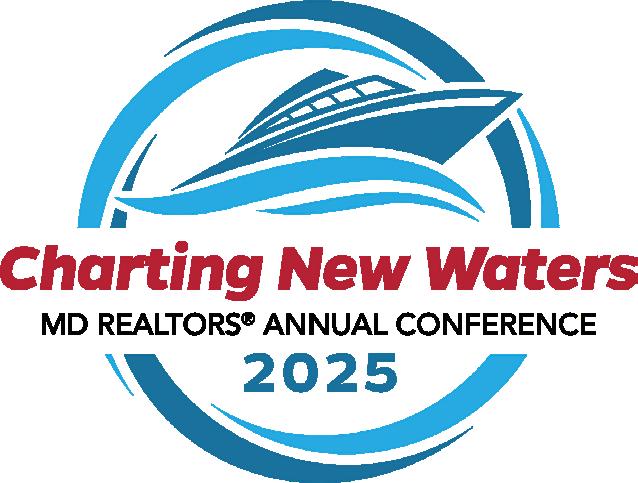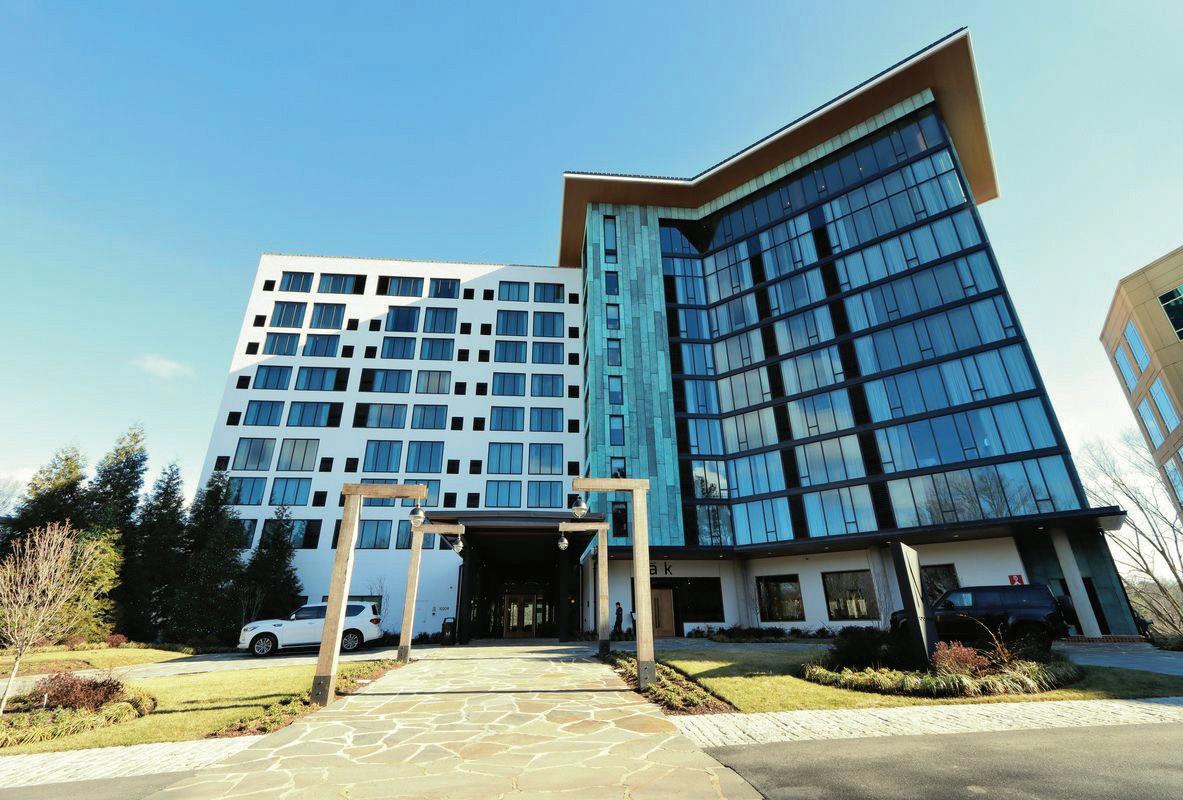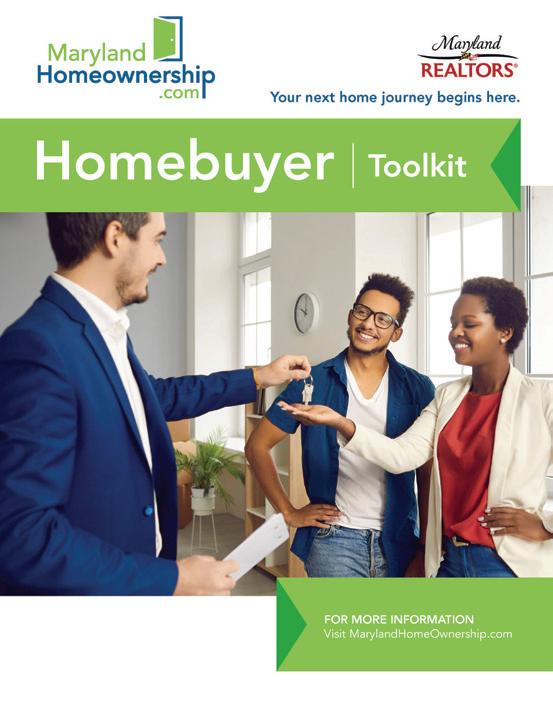

Homeownership Month






Cheryl Abrams Davis PRESIDENT
RE/MAX United Real Estate
14340 Old Marlboro Pike
Upper Marlboro, MD 20772
301.702.4200
cherylabrams@remax.net

Melanie Gamble SECRETARY
212 Degrees Realty, LLC 9701 Apollo Dr., # 301 Upper Marlboro, MD 301.343.8538 melanie@melaniegamble.com

Chris Hill
IMMEDIATE FORMER PRESIDENT
Century 21 New Millennium
23063 Three Notch Road
California, MD 20619
301.862.2169
chris@thechrishillteam.com

Denise Lewis PRESIDENT-ELECT
Brook-Owen Real Estate 41 E. Main Street Westminster, MD 21157
410.871.1110
denise@denisehasthekeys.com

Chris Jett TREASURER
ReMax Advantage Realty Shore 4U Division 23 Fountain Drive West Ocean City, MD 21842
443.523.2360 chris@shore4u.com

Chuck Kasky, RCE CHIEF EXECUTIVE OFFICER
Maryland REALTORS® 200 Harry S Truman Pkwy. Suite 200 Annapolis, MD 21401
800.638.6425
chuck.kasky@mdrealtor.org
Maryland REALTORS ®
200 Harry S Truman Parkway | Suite 200 Annapolis, MD 21401-7348
443.716.3500 | www.mdrealtor.org
Leadership Team
Cheryl Abrams Davis | President
Denise Lewis | President-Elect
Chris Jett | Treasurer
Melanie Gamble | Secretary
Chris Hill | Immediate Former President
Chuck Kasky, RCE | Chief Executive Officer Editor
Daniel Patrell | dan.patrell@mdrealtor.org
Advisory Committee
Kristin Skeweris | Chair
Donald Frederick | Vice Chair
Advertising Arlene Braithwaite | 410.772.0820
Publication Design and Printing
Ironmark, 9040 Junction Dr, Annapolis Junction, MD 20701 888.775.3737 | ironmarkusa.com
The opinions expressed by nonstaff contributors may not reflect the official opinion of Maryland REALTORS® and/or policies derived from leadership and staff.
Mission Statement
Maryland REALTORS® exists to support all segments of its membership and their specialties. Maryland REALTORS®, through collective efforts with local boards/associations and the National Association of REALTORS®:
■ Develops and delivers programs, services and related products that maintain and elevate the high standards of the real estate business and the professional conduct of its practitioners;
■ Assists members in ethically and professionally serving the public;
■ Promotes and preserves the right to own, transfer and use real property; and
■ Protects the right of members to conduct business within a framework of fair and reasonable laws and government regulations.
In principle and in practice, Maryland REALTORS® values and seeks diversity and inclusive participation within the field of real estate and recognizes each member as a unique individual.
Pledge to Uphold “The Code”
I’m sure I don’t have to tell you that our profession is constantly evolving. With new technologies, changing market dynamics, shifting business practices, and varying client expectations, it can sometimes feel overwhelming. While we can’t control the headlines, (no matter how much noise we hear about our industry), the one thing that we can control is our adherence to the REALTOR® Code of Ethics, which is one thing that remains constant. It’s more than a document that is reviewed in class every two years. It is the bedrock of trust that sets REALTORS® apart from licensees and elevates our profession in the eyes of REALTORS® and the public.
A Higher Standard
The Code of Ethics isn’t just a guide, it’s a promise. It tells our clients, colleagues, and communities that we hold ourselves to the highest standards of honesty, fairness, and professionalism. When we agree to abide by the Code, we commit to putting the interests of our clients above our own, cooperating with fellow REALTORS®, and protecting the integrity of the marketplace. Unlike general state licensing requirements, the Code is unique to REALTORS®. It goes beyond legal obligations, demanding behavior that reflects both moral judgment and a deep sense of responsibility.
Duties to Clients and Customers
At its core, the Code insists on fidelity to clients. Article 1 reminds us that our primary duty is to protect and promote the interests of those we serve while still treating all parties honestly and, at least in Maryland, fairly. That obligation can be challenging, but it is central to building trust and long-term relationships. From full disclosure and informed consent to diligent
representation, the Code reinforces the importance of transparency in every transaction.
Duties to the Public
Our responsibility doesn’t end with our clients. The public depends on us to be knowledgeable, accurate, and ethical. Articles 10 and 11, for example, guide us in matters of fair housing and competency. As REALTORS®, we commit to ongoing education and to avoiding discrimination in all its forms. Especially today, when social awareness and equity are front and center, adherence to these principles is not just good practice, it is essential leadership.
Duties to Each Other
Perhaps one of the most unique aspects of the Code is how it governs our conduct toward fellow REALTORS®. Articles 15 through 17 emphasize respect, cooperation, and constructive conflict resolution. Healthy competition is expected; unethical behavior is not. Whether in negotiations, marketing, or public statements, we owe each other professional courtesy and mutual respect.
Leading by Example
As members of this association, we are not just individual professionals, we are part of something larger. Our collective commitment to ethical practice enhances the REALTOR® brand and helps ensure our clients receive the care, expertise, and integrity they deserve, which adds to our value. Let’s speak up when we see misconduct and continue raising the bar for what it means to be a REALTOR®.
When the noise gets loud, the transaction gets tough, and the headlines show uncertainty, refer back to the foundation of our Code of Ethics. And more importantly— pledge to uphold “The Code!” ■

Cheryl Abrams Davis Is Maryland REALTORS®’ 2025 President.
You’re Invited! Community Canvas: Creating Thriving Connections
BY DYANA QUINZI
Expand your community. Forge new relationships. Enhance existing ones.
Join us on June 25th for the Community Canvas: Creating Thriving Connections workshop. This transformative event is designed to broaden your network and empower you with the tools and insights necessary to foster inclusive environments within the REALTOR® community.

We are thrilled to announce our keynote speaker, Leah Rothstein, author of Just Action: How to Challenge Segregation Enacted Under the Color of Law. The event also features two interactive panels. The first panel will address accessibility issues and provide strategies to improve your skills when working with clients who have different physical or neurological abilities. The second panel will delve into real-life experiences and challenges faced by the REALTOR® community, offering attendees the opportunity to discuss best practices for tackling tough topics.
The event will conclude with a casual networking reception, where participants can engage in deeper,

more personal conversations over drinks and snacks.
Brought to you by the Maryland REALTORS®’ Diversity, Equity, and Inclusion Advisory Group, this all-day event offers a dynamic platform for professionals seeking to enhance their understanding and implementation of Diversity, Equity, and Inclusion (DEI) principles in both their professional and personal lives, and to advance the building of more inclusive communities. ■

Dyana Quinzi Is the Education Administrator for Maryland REALTORS®.
Community Canvas: Creating Thriving Connections
June 25, 2025
Merriweather Lakehouse 10209 Wincopin Circle Columbia MD 21044
merriweatherlakehouse.com/
Free parking is available on site.
Registration begins at 10:00 A.M., and the networking event will conclude at 5:30 P.M.
Lunch will be provided.

Register today by scanning the QR code!
Merriweather Lakehouse Hotel
Celebrating MREC’s Newest Member
Maryland REALTORS® congratulates the Maryland Real Estate Commission’s (MREC) newest member to its Board, Joseph Wilson, a member of the Coastal Association of REALTORS® (CAR) and Broker and Founding Partner of Coastal Life Realty Group in Ocean City.
For the MREC, Joe will represent the counties of Cecil, Caroline, Dorchester, Kent, Queen Anne’s, Somerset, Talbot, and Wicomico.
With more than 15 years of real estate experience, Wilson comes to this new position with extensive leadership experience including service as the 2020 President of CAR, the Maryland REALTORS® Executive Committee, and the state association’s Bylaws Committee.
“We couldn’t be prouder to see Joe take on this important statewide role,” said Bernie Flax, CAR CEO. “His leadership, dedication, and heart make him a true asset to the Maryland Real Estate Commission.” ■

Step Up. Get Involved. Make an Impact.
The 2026 Maryland REALTORS® Committee Selection Season is officially open—and we’re calling on motivated, forward-thinking members to help shape the future of real estate in Maryland.
Under the leadership of President-Elect Denise Lewis , several committees have been reimagined with new missions—creating exciting opportunities for members with vision, passion, and expertise to make a lasting impact.
If you’re committed to advancing our industry and want your voice heard, now’s the time to raise your hand.
What You Need to Know
■ Deadline to apply: June 26 at 5 PM
■ You’ll choose your top committee and one alternate
■ Share your background and experience related to your selections
Explore Committees & Apply


Scan the QR Code to learn more about committee missions.
Follow this QR Code to submit your name and qualifications.
We want your ideas. We need your leadership. Volunteer today and help drive real estate forward.

Joseph Wilson
Every Cloud has a Silver Lining REALTORs®
scored wins during a session filled with budget woes.
BY LISA MAY

In a tough 2025 General Assembly Session, REALTORS® Achieved Priority Wins
Six months ago, Maryland’s future showed more storm clouds than sunshine. What started as an estimated budgetary shortfall of $3 billion escalated to $3.3 billion in the opening weeks of the 2025 General Assembly session. Hopes that Maryland’s economy could grow its way to fewer cuts or lesser taxes ran into a reality that could no longer be ignored by policymakers.
This impacted the 90-day Session in several ways. First, REALTORS® had to be more engaged in the budget process than ever before, as an ever-changing assortment of tax and fee provisions were floated to bridge the budget gap. Second, the time legislators would need to devote to fiscal matters meant fewer opportunities to consider other policy matters, like housing supply. Finally, bills which imposed costs on state operations were often pulled from consideration, even those which had already received a scheduled hearing, or were held before being introduced.
Yet, even when facing those headwinds, REALTOR® advocacy efforts returned results on our priority issues in several categories.
Housing
A top housing priority for Maryland REALTORS® over the past four years was promoting and allowing greater use of Accessory Dwelling Units (ADUs). While the path this issue took to passage was both frustrating and unnecessarily long, we can finally say that statewide
legislation to require local governments in include ADU provisions in their zoning ordinances is a reality.
Over the next 18 months, each county and municipality which has zoning authority over single-family detached residential properties must update their codes to comply with HB 1466/SB 891 (see sidebar for detailed provisions). Both state and local REALTOR® associations will remain engaged in this process to ensure that these zoning amendments provide as much flexibility as possible for homeowners who wish to add an ADU to their properties.
Not all housing proposals were as successful, even those proposed by the Moore Administration. What was introduced as the Housing for Jobs Act, HB 503 would have tied local housing production needs to employment figures and limited the ability of local governments to deny new housing developments when a shortage exists. This was a welcome step toward acknowledging the vital role that housing plays in supporting our workforce and economic success.
Unfortunately, county and municipal governments once again stepped in to oppose common sense housing solutions. After securing support for amendments to remove linkages between housing goals and employment, leaving only a limited vesting option for new housing developments, the bill was further weakened in the Senate to a mere study. With the resulting bill bearing little resemblance to the original, the Administration abandoned its push for passage, and the bill died.
It is a sad reminder that even with the success of ADUs and 2024’s Housing Expansion Act, we have not yet
defeated local government obstructionism or the lack of political will to overcome it. It is a battle that housing advocates, including REALTORS®, must continue to fight and win.
Consumer Protection
Following a multi-year effort on the issue, REALTORS® were successful in addressing the assignment of real estate contracts, informally known as “wholesaling.” Original proposals to require licensure for those engaging in routine assignments of contracts were opposed by state regulators, but that did not deter our efforts. HB 124/SB 160 requires that notice be given if a contract for sale may be assigned.
By pivoting to a required disclosure model, based on current Arizona law, property owners and eventual property buyers can achieve needed transparency in the transaction. In addition, this bill provides that if the owner or purchaser does not receive the required disclosure, they may rescind the sale at any time before settlement without penalty.
It is a sad reminder that even with the success of ADUs and 2024’s Housing Expansion Act, we have not yet defeated local government obstructionism or the lack of political will to overcome it.’
Similarly, we experienced a breakthrough in combatting the fraudulent possession of property by squatters. While legislation to address squatting had been introduced in previous sessions, tenant advocates had been successful in claiming that any changes to current procedures would be abused by landlords to wrongfully evict lawful tenants. However, in the past year, many members of the General Assembly were made aware of or even were asked to intervene in squatting incidents involving their constituents, which changed the balance of the policy debate.
The result was a host of bills on the subject, with SB 46 being the final legislative vehicle to enact an expedited unlawful detainer process. Beginning October 1, unlawful detainer hearings will be required to be held no later
Key Provisions for ADUs (HB 1466/SB 891)
■ Local Law Requirement: By October 1, 2026, the legislative body of counties and municipalities must adopt a local law authorizing the development of ADUs on land zoned for single-family residential use.
■ Zoning Use Permit Applications: The law outlines requirements for the approval of zoning use permit applications related to ADUs, with localities able to place restrictions based upon resident health, safety, and welfare.
■ Density Exclusions: ADUs are excluded from density requirements and other limits on residential growth that apply to the parcel.
■ Setbacks: Localities may not require setbacks that exceed existing requirements for other accessory structures.
■ Parking Requirements: The creation of onand off-street parking spaces for ADUs is addressed under certain criteria, including consideration of available parking, costs to construct, and increases to impervious surfaces as determined by a parking study. Localities must provide a parking waiver process.
■ Restrictions on Property Instruments: The legislation prohibits unreasonable restrictions on the development or use of ADUs on property zoned for single-family residential use in recorded instruments affecting the transfer or sale of real property.
■ Homeowners’ Association Authority: It authorizes the governing body of a homeowners’ association to treat an ADU as a separate lot for purposes of voting and levying assessments.
■ Historic Properties: Restrictions on ADU development can be placed on properties designated on the Maryland Register of Historic Properties or on parcels where the only vehicular access to the ADU is through an alleyway.
New Tax Provisions in the FY 2026 Budget
The Budget Reconciliation and Financing Act (HB 352) makes several changes to Maryland tax policy::
■ Itemization: Increasing the standard deduction by 20%, while gradually phasing out itemized deductions for those with adjusted gross incomes above $200,000
■ Income Taxes: Adds two new income tax brackets:
• 6.25% for single filers of $500,000$1 million and joint filers of $600,000$1.2 million
• 6.5% for single filers above $1 million and joint filers above $1.2 million
■ Capital Gains: Establishes a 2% surcharge on net capital gains if adjusted gross income is above $350,000. This does not apply to the gains from the sale of real property used as a primary residence sold for less than $1.5 million.
■ Technology Taxes: Imposes a 3% tax on data and IT services provided within Maryland, based upon federally defined categories, while excluding certain cloud computing, cyber security, and other emerging technology services.
■ Local Income Taxes: Local governments are authorized to increase the local income tax rate from 3.2% to 3.3%.
■ New vehicle fees and taxes: Includes increases to titling fees, excise tax rates, annual registration fees, rental taxes, and tire purchases.
than 10 days following the complaint filing, with service of process occurring in no more than 4 days. Should the property occupant choose to appeal the court’s decision and remain in the property during that appeal, the occupant must file a bond with the court or pay the property owner the fair rental value of the property, court costs, and all losses and damages occurring before and during the appeal.
Real Estate Education Requirements
Maryland REALTORS® were also successful in passing HB 972/SB 680 to address inconsistencies and outdated provisions in state law regarding the provision of real estate continuing education. To match national requirements, classes for Fair Housing will now be 2.0 hours for all residential licensees; for those who are exclusively commercial practitioners, 2.0 hours of compliance with the Americans with Disabilities (ADA) Act will now be required.
The bill also clarifies an interpretation by the Real Estate Commission which required separate brokerage classes for initial and renewal licensees (known as BRAD-SD and BRAD, respectively), which will now be returned to a single requirement for all renewal types. Broker Supervision classes will be reduced from 3.0 hours to 1.5 hours, to better reflect course content, and information on the practice of “flipping” will be removed from Ethics classes. Finally, the bill sets a single standard for real estate schools to select qualified instructors and develop course materials for all continuing education offerings.
Condos and HOAs
It took several attempts, but legislation providing additional flexibility to community associations to meet reserve funding requirements has received final approval. HB 292 clarifies which items should be included in reserve study calculations and updates to those studies and gives associations two more years and additional funding methods to show compliance with reserve requirements. The bill also allows the governing body of the association, following a twothirds majority vote, to alter established reserve funding plans for up to one fiscal year if experiencing financial hardship.
However, the General Assembly did not pass other reform proposals, including those to license community
managers or to reign in fees charged in the resale process.
Property Management
Landlord-Tenant issues are always a difficult one for REALTORS®, with what seems an annual ritual of battling bad proposals and minimizing damages on what eventually becomes law. While there was no shortage of bad bills, the “worst of the worst” remained bottled up in the final hours of Sine Die.
With “good cause” legislation advancing through the House in 2024, many feared this would be the year it received final approval. The Senate had other plans. By acknowledging that the multiple layers of landlord restrictions were taking a toll on housing production and the availability of rental housing, Senate leaders proposed a compromise: local governments could choose to enact “good cause” or rent stabilization, but not both. This provision changed the tenor of the conversation about HB 709/SB 651. Without an agreement from the stakeholders, “good cause” was put on hold for yet another year.
Bills impacting rentals that did receive approval were:
■ HB 767/SB 442 , setting advance notice requirements for evictions;
■ HB 1076, to provide advance notice of landlord entry;
■ HB 1152/SB 896, requiring listing of pet policies in the rental application and on a property’s website (if any); and,
■ SB 856, outlining a landlord’s responsibilities for tenant mold complaints
REALTORS® were successful in obtaining favorable amendments to all the above legislation.
Budget
Finally, we come to the most substantial issue of session: the budget.
REALTORS® had good reason to worry about what taxes and fees might be imposed on the industry. The Administration’s budget avoided direct taxes on real estate services, but did propose eliminating itemization on state tax returns, pausing new opportunity zone tax credits, and lowering estate tax exemption levels.
The Administration’s budget avoided direct taxes on real estate services, but did propose eliminating itemization on state tax returns, pausing new opportunity zone tax credits, and lowering estate tax exemption levels.
That was hardly the extent of budget items that were on the table. Stand-alone legislation was introduced to increase statewide property taxes and transfer taxes, and Department of Legislative Services staff recommended increasing both to generate part of the revenue needed to close budget shortfalls. There was also a return of sales taxes on services, though at a lower rate than in 2024 and excluding industries directly related to housing.
By the end of the debate however, REALTORS® were able to minimize impacts on real estate, particularly when considering what could have been. (See the sidebar for final budget provisions). This was due in large part to the successful advocacy efforts of the past few years, where we have emphasized Maryland’s housing affordability and supply challenges. It’s fair to say that message is beginning to resonate, at least as far as the 2025 Session is concerned.
Maryland’s budget woes may not be over. Federal level uncertainties have already set off rumors of a special session in early Fall, raising the possibility of additional budget cuts or revenue actions.
But for today at least, REALTORS® can find some rays of sunshine from an otherwise cloudy 2025 General Assembly Session. ■

Lisa May is the Director of Advocacy and Public Policy for Maryland REALTORS®.






































































BY JACKY MUECK
First Time Homebuyer’s Guide
This guide gives any first-time homebuyer the basic info they need to prepare for the first steps they can take to become a homeowner. While there are many steps, we’ve highlighted some of the most important ones, like understanding their credit score or determining their price range.
We also cover the basics of buyer pre-approval: understanding the letter they get from a lender; that pre-approval doesn’t lock in an interest rate; and the importance of homebuyer education.
There’s even a whole list of first-time home buyer programs in Maryland that they may qualify for, categorized by who offers the program, whether it’s the Maryland Mortgage Program (MMP) or a county. Firsttime buyers can see just how many opportunities there are to help them, from MMP’s SmartBuy to Freddie Mac’s Home Possible Mortgage.
Homebuyer Toolkit
Our toolkit is a robust start-to-finish guide for any homebuyer. Filled with information about every step of the process, this is a must-have resource for any homebuyer. In a step-by-step order, it gives hopeful homebuyers information on all areas of the buying process, beginning with questions to help determine if they’re ready to buy a home and the benefits of homeownership. The toolkit also has information on ten steps to buying a home to give an overview of the entire process. Plus, both our Homebuyer and Home Seller Toolkits are available in English and Spanish, making them accessible to more future Maryland homebuyers!
Financial wellness information includes five steps to financial readiness to buy a home and information about credit scores, which highlights steps buyers can take to improve their credit scores. Buyers can also learn about homebuyer education and advantages that come with it, like qualifying for loans.
The value of working with a REALTOR® is another highlight of the toolkit. It clearly shows why working with a REALTOR® sets them up to get the best guidance, insight, and expertise. Eight big reasons to use a REALTOR® and understanding the difference between a real estate agent and a REALTOR® clearly demonstrates the advantage of having a professional on the buyer’s side.
To help homebuyers find a REALTOR® that works best for them, the toolkit also includes a list of questions they can ask when interviewing REALTORS®, from asking about the Buyer Brokerage Agreement to asking about communication styles and methods you may use. These questions also have some context with them to give homebuyers an idea of how these essential questions can be the basis for a productive relationship with you.


The toolkit also covers how agency relationships work, the difference between a customer and a client, and what fiduciary duties are expected once the buyer brokerage agreement is completed. This way, your client can easily access information about what to expect from you as their agent. Fair housing is another crucial issue the toolkit reviews. Buyers can learn about the REALTOR® commitment to equal opportunity, a buyer’s fair housing rights and responsibilities, and information about the Fair Housing Act.
The toolkit covers preparation for house hunting, making an offer, the appraisal process, homeowner’s insurance, title insurance, home inspections, common home hazards, and the final steps to settlement and closing. It also includes essential checklists for mortgage applications, final walkthroughs, and moving preparation.
The Homebuyer Toolkit has everything a first-time homebuyer needs to start their journey off on the right foot!
Working with a REALTOR®
Just like in our toolkit, MarylandHomeownership.com highlights the value of working with a REALTOR®. Our page on the value and benefits you bring to any transaction helps answer some of the common questions you may encounter when meeting with new clients, like what a REALTOR® is and why they should work with one. It also provides tips on how to find a REALTOR® for any homebuyer who needs pointers on how to find their preferred REALTOR®.

Financial Wellness
You know just how important financial wellness and education are for first-time homebuyers and the struggle many home buyers go through to save up money for their first home. Here, homebuyers can find information about MMP-Approved Courses, Freddie Mac, CreditSmart and Homebuyer U, and the Maryland Council on Economic Education to get homebuyer education and to find tools to help themselves prepare for the journey ahead.
First-Time Homebuyer Savings Account
We also have a page on the Maryland First-Time Homebuyer Savings Account! This program is perfect for anyone planning to buy a home in the next 15 years. This can be any savings account the future homebuyer already has. The program is a tax credit where Marylanders can claim up to $5,000 a year (totaling $50,000 over 10 years) to buy a home within 15 years of opening the account.

Co-Branding Opportunity!
Did you know you can co-brand the Homebuyer and Home Seller Toolkits? Using the available white space on the cover, you can put your logo and info on the bottom left of the toolkits you share with your clients!
There are three easy ways you could choose to add your information:
1. Use a document or image editor (like Canva or Adobe Acrobat) to add your information digitally before sharing online or printing.
2. Make stickers with your info you can add to physical versions of the toolkit.
3. Staple your business card to the cover.
Plus, you can get copies of the toolkits for FREE from the Maryland REALTORS® office in Annapolis or at events!
Housing Opportunity Certification
The Housing Opportunity Certification (HOC), in addition to being highlighted on our list of Real Estate Designations and Certifications, is also the list of REALTORS® MarylandHomeownership.com uses for the Find a REALTOR® Database.
Learn more about earning an HOC certification and renewal requirements on our website! Members who have successfully earned their HOC certification will be listed in this online database.


Home Loans and Grants
One of the most popular pages on the consumer site is Maryland Home Loans and Grants. These programs are essential to any first-time homebuyer to understand just how many programs there are to help them get to that settlement table and sign the dotted line . From MMP’s incredible programs to local programs, homebuyers can educate themselves on their eligibility for certain programs in different areas of the state.
Fair Housing
Brushing up on fair housing protections is smart for any Marylander, especially as protections may change over time. First-time homebuyers may not know about their federal, state, and local protections. This page gives Marylanders a review of all of the protected classes at each level, information on where to report violations, and additional resources. It also explains why “Love Letters” can create a fair housing issue, putting buyers, sellers, and their agents at risk.
MarylandHomeownership.com
Resources
Learning Key Terms & Designations
First-time homebuyers have likely heard a lot of real estate industry terms, like “Escrow” and “MLS” but don’t really understand what they mean and why they’re
important. MarylandHomeownership.com has a full list of essential real estate terms for buyers (and sellers) to know and understand, sorted by category to make sure any future homeowner can easily build the foundation of their knowledge. From mortgage terms to legal documents, your client can get a head start on learning about different types of insurance and much more.
There’s also a list of all the designations and certifications you as a REALTOR® may have, along with short explanations of what they mean for your areas of expertise and wealth of knowledge. This gives your client a better understanding of how you have gone above and beyond in your education and experience to understand the industry and different situations.
Home Inspection Checklist
A home inspection is a vital part of the homebuying process, protecting buyers and their investment. While it can be confusing and overwhelming for first-time buyers, the home inspection checklist on the site lays out all areas a home inspection is required to review and the various other inspections you may recommend or may be required based on the home.
Your Homebuying Keys: The FREE Monthly Webinar
MarylandHomeownership.com also offers free monthly webinars for first-time homebuyers--and open to all. At this monthly webinar, buyers hear from experts in
the industry review information about the homebuying process and the current market.
Each month, guests include a knowledgeable REALTOR® member, a top lender as picked by the Department of Housing and Community Development (DHCD), Freddie Mac to review homebuyer education, and MMP to discuss loan programs available for first-time buyers and qualification requirements.
Attendees get the chance to ask their questions throughout the webinar and get answers in a pressureand stress-free environment.
Video Resources
Videos are also available on MarylandHomeownership. com! From steps to buying to steps you can take in high school to begin working towards your first home, there are videos for buyers to learn about the journey ahead of them.
Our newest series of videos includes information all about compensation where buyers can learn about
negotiating compensation, cooperative compensation, and even seller concessions.
Homebuyer Blogs
Our blog covers a multitude of topics for buyers (and others!) who have more specific questions about anything ranging from radon to housing fraud. Buyers can learn more about these essential topics to help prepare for the next step in their journey and get access to other resources to learn even more. ■













Jacky Mueck Is the Advocacy-Communications Administrator for Maryland REALTORS®.
U.S.
As one of the largest generational groups, they present a growing opportunity for real estate professionals. Gen Z already accounts for 3% of the market, and they represent the largest share of single buyers in the market, according to the 2025 “Profile of Home Buyers and Sellers Generational Trends Snapshot.”

From TikTok to Title: Gen Z’s Approach to Home Buying Working With Younger
Buyers, Demographic Groups, Residential Real Estate BY
BY BARBARA BALLINGER.
Starter homes? Gen Z is thinking longer-term. Today’s young consumers come with their own values, habits and tech mindsets. Learn how to build trust with this growing cohort of home buyers.
Despite their youth and the challenges of high mortgage rates and limited inventory, many Gen Zers are eager to purchase single-family homes, townhouses or condominiums.
What they lack in life experience, they often make up for with diligence in research. At the same time, they understand their limited experience and turn to agents not just as transaction facilitators but as consultants. They’re often eager to be introduced to financial advisers, attorneys and loan officers. In many cases, they want parents to be part of the discussion and process, too.
By recognizing their preferences, you can earn their trust and expand your business.
Why They Buy
Alex Wolking, team leader at Keller Williams OneChicago, notes that Gen Z tends to view homes more as financial assets than emotional purchases.
Focus groups conducted by The Klotz Group of Companies in Atlantic Beach, Fla., reinforce that belief. With platforms like Airbnb and VRBO rising in popularity, many Gen Zers view property ownership as a way to generate income, says founder Jeff Klotz.
Brady Byrne, 24, a licensed real estate agent and thirdgeneration broker with The Byrne Group at Baird &
Warner, in the Chicago suburb of Naperville, purchased his first home—a condo—during college. “If I decide to buy a second larger home, I’ll keep the first to rent out,” he says. Still, he advises peers to consider renting if they expect major life changes that could require relocation.
Pro tip: Emphasize financial advantages related to size, condition, price, location and amenities. Understand they’ve already done extensive research via Zillow, TikTok and other platforms.
How Size Matters
Many Gen Zers prioritize features over square footage, often preferring smaller homes due to their minimalistic lifestyles and love of travel, Klotz says.
Byrne notes that his Gen Z clients favor walkable locations near bars, grocery stores and restaurants. Walkability often outweighs extra space since “some don’t own cars,” he says.
In Los Angeles, Claire O’Connor says she’s been showing Gen Zers homes of at least 2,500 square feet. These affluent buyers want to entertain and accommodate a growing family, says O’Connor, a sales associate with O’Connor Estates, Berkshire Hathaway Home Services, serving primarily Los Angeles’ Westside neighborhoods.
Jose Prats, director of character homes at Christie’s International Real Estate in Los Angeles, specializing in serving clients looking to buy and sell architecturally significant houses, says Gen Z buyers are more interested in how a home functions—especially for remote work— than its size. “The ability to customize or adapt spaces to fit is often more important than total size,” he says.
Pro tip: Highlight walkable locations and how to maximize usable space.
What Locations Appeal
Although walkability is a selling point of many Gen Z buyers, preferences vary by market. In Los Angeles, for example, affordability is pushing Gen Z buyers beyond the city center. There, homes with architectural charm— like Spanish and Craftsman styles—are gaining popularity, says Prats.
Pro tip: Don’t bring any preconceived notions to the table. Take time to understand each buyer’s lifestyle, tastes and budget.
How They Plan to Pay
Financing strategies vary widely. Some Gen Zers are open to co-purchasing with friends or family, while others save independently. Wolking notes that several of his Gen Z clients saved over $100,000 for a down payment.
Pro tip: Start the conversation on financing early so you can meet them where they are.
Condition and Amenities
Prats says Gen Z buyers he’s worked with prefer to pay a premium for quality. Some are open to light maintenance or renovations if it gets them more character or outdoor space, he says.
One reason move-in ready appeals to Gen Z buyers: They may lack the experience to envision improvements. Plus, funds are often tight—which may discourage them from taking on the unknown expense of renovations.
Pro tip: Help Gen Z buyers envision improvements, and be transparent about the extent of needed updates or repairs.
Amenity Priorities
Gen Z buyers starting careers may be short on time and so may seek low-maintenance living: no lawn care, snow removal or roof issues, Byrne says.
Outdoor space is highly valued. For condo purchasers, that could mean a balcony or roof terrace, Wolking says.
Prats highlights additional priorities: smart home tech, sustainability and flexible layouts to support remote work. Opinions on pools and gyms are mixed—some see value, others view them as costly burdens. Above all, Gen Z buyers want a home that reflects their identity, says O’Connor, often in the form of open layouts.
Pro tip: Ask questions about clients’ lifestyle preferences and, if possible, follow them on social media. Take note of what they’re consuming and what they
continued on page 28
Welcoming a New Era at the Maryland Real Estate Commission
BY SCOTT LEDERER
As the newly appointed Executive Director of the Maryland Real Estate Commission, I am honored to introduce myself to Maryland REALTORS® across our great state. My career in real estate and regulatory affairs has given me a deep appreciation for the challenges and opportunities in our industry. I look forward to working collaboratively with all of you to advance our shared goals.
The Role of the Maryland Real Estate Commission
The Maryland Real Estate Commission plays a crucial role in ensuring the integrity and professionalism of the real estate licensees in our state.
We are here to serve Maryland consumers and the real estate licensees we regulate. The Commission was created to protect the health, safety, and welfare of the public through examination, licensing, and regulatory activities; to uphold and apply the governing real estate laws and regulations equally to all; to provide courteous, reasonable, and professional assistance; and to impartially conduct disciplinary actions.
We accomplish this through licensing, education, and enforcement. By maintaining rigorous licensing standards, overseeing both prelicensing and continuing education
providers, and enforcing compliance with our regulations, we ensure that Maryland’s real estate licensees are equipped to serve their clients effectively and ethically. The Commission regulates approximately 48,000 active licensees in Maryland. You’ll find information about our services, answers to questions, and special announcements on our website by following this QR Code.
Consumer Protections:

Priorities for the Coming Year
As I step into this leadership role, I want to share some of my priorities for the year ahead:
1. Fostering Collaboration: The Maryland Real Estate Commission will engage closely with industry leaders, including Maryland REALTORS®, to ensure our policies and initiatives reflect the needs of professionals and consumers alike. I am excited to open the lines of communication with brokerages and licensees by, for example, attending brokerage and association seminars and training meetings. I find these opportunities mutually beneficial, and I firmly believe that increasing familiarity with regulations will foster compliance. Strengthening
Buyers and sellers rely on real estate professionals to guide them through one of the most significant transactions of their lives. The Commission will continue to enhance consumer confidence by ensuring transparency, ethical conduct, and accountability. Enforcement of advertising guidelines and monitoring compliance with applicable laws and regulations will be priorities in the coming months.
2. Enhancing Professional Development: Continuing education and professional growth are essential in an ever-changing market. I aim to work closely with our education providers to ensure agents and brokers stay ahead of industry trends and regulatory changes. This will also help promote compliance, as we boost awareness of updated agency and supervision practices.
3. Leveraging Technology for Efficiency: Modernizing our licensing and compliance processes through digital platforms will streamline operations, making it easier for real estate licensees to stay compliant and informed.
Navigating Market Changes Together
The real estate landscape is evolving rapidly, influenced by economic shifts, legislative changes, and technological advancements. Interest rates, housing inventory, and buyer behavior are all in flux, creating challenges and opportunities. As regulators and industry leaders, it is our responsibility to adapt and find solutions that benefit the entire Maryland real estate community.
A Commitment to Ethical Excellence
The foundation of a successful real estate market is trust. Upholding
high ethical standards and enforcing regulations fairly and transparently are non-negotiable commitments. As executive director, I will work diligently to ensure the Maryland Real Estate Commission operates with integrity and fairness, reinforcing consumer trust in our industry.
Looking Ahead
I am excited about the opportunities that lie ahead for Maryland’s real estate professionals. This industry is a cornerstone of our state’s economy, and we can strengthen it together. I encourage all members of Maryland Realtors to engage with the Commission, share

feedback, and collaborate in shaping the future of our profession.
I appreciate your commitment to excellence, and I look forward to working with you in the months and years to come. ■


Scott Lederer is the Executive Director of the Maryland Real Estate Commission.
The Constitutional Case Against Exclusionary Zoning
BY CHUCK KASKY
Exclusionary zoning laws, a pervasive feature of land use planning in the United States, have long been scrutinized for their discriminatory effects on marginalized communities. These laws typically impose restrictions that exclude lowerincome residents, predominantly affecting racial minorities, by limiting the construction of affordable housing or multifamily units. While the social and economic implications of zoning have been extensively debated, its constitutional standing presents a compelling legal question.
At its core, zoning practices clash with principles embedded in the U.S. Constitution, particularly in relation to the Equal Protection Clause of the Fourteenth Amendment, and perhaps even the takings clause of the Fifth Amendment. Zoning perpetuates systemic inequities, obstructs socioeconomic mobility, and undermines democratic ideals of fairness and justice.
The Fourteenth Amendment: Equal Protection Clause
The Equal Protection Clause of the Fourteenth Amendment serves as a cornerstone for challenging exclusionary zoning. It mandates that no state shall “deny to any person…the equal protection of the laws.” This

clause has historically been invoked to address discriminatory practices rooted in racial or economic inequality. Exclusionary zoning, which disproportionately impacts minority and low-income populations, can be seen as a violation of this constitutional provision. For instance, by restricting the development of affordable housing, zoning effectively prevents lowerincome families, often disproportionately people of color, from accessing certain neighborhoods. This leads to the de facto segregation of communities, a reality starkly at odds with the promise of equal protection. Landmark cases such as Shelley v. Kraemer (1948), which invalidated racially restrictive covenants, and Village of Arlington
Heights v. Metropolitan Housing Development Corp. (1977), which set a framework for evaluating discriminatory intent in zoning laws, provide significant legal precedents for challenging zoning under the Equal Protection Clause.
Zoning, even when not explicitly discriminatory, operates in a way that entrenches existing racial and socioeconomic disparities. Courts have recognized the harm of policies with discriminatory effects, emphasizing that actions with a disparate impact on protected classes may violate constitutional rights, even if discriminatory intent is not immediately evident.
Regulatory Takings
A “taking” typically refers to instances where the government physically seizes private property for public use, like building a road or a park. However, courts have recognized that even when no physical property is seized, a regulation can be so burdensome that it effectively takes away the property’s economic value or viable use, triggering the Fifth Amendment’s protections.
The U.S. Supreme Court has developed two main approaches to determine whether a regulation, such as zoning, constitutes a taking:
1. Categorical Taking. In Lucas v. South Carolina Coastal Council, (1992) the court held that a taking occurs when a regulation deprives a property owner of “all economically beneficial use” of their land.
2. Balancing Test. The approach taken in Penn Central Transportation Co. v. New York City (1978) considers factors like the regulation’s economic impact, how it interferes with reasonable investment-backed expectations, and the character of the government action.
When Zoning Could Be a Taking
Most zoning laws are upheld as a valid exercise of a government’s “police power” to regulate land use in the interest of public welfare, health, and safety. Village of Euclid v. Ambler Realty Co., (1926). However, zoning could be
considered a taking in rare cases, such as:
■ When the zoning change significantly devalues a property.
■ When the zoning restriction leaves no viable or productive use for the land.
■ When the zoning regulation is perceived as arbitrary or discriminatory without serving a legitimate public purpose.
The courts have gradually developed a body of law to determine the limits of zoning power. If a zoning ordinance goes too far, the law requires compensation for the property owner. Zoning does not go too far simply because it causes a loss. Thus, commercial property can be rezoned to low density residential, although the property owner may suffer a huge financial loss.
Contemporary Relevance
In recent years, zoning has gained renewed attention amid growing concerns over housing affordability and racial inequality. Activists and policymakers have pushed for reforms to dismantle exclusionary practices, emphasizing their unconstitutional underpinnings. States like California and Oregon have begun to enact legislation that overrides local zoning restrictions to promote multifamily housing and affordable developments.
Zoning itself is generally not considered a “taking” under the Constitution. However, there are situations where zoning regulations could cross the line and amount to what is known as a
“regulatory taking” under the Fifth Amendment, which states that private property may not be “taken for public use, without just compensation.”
The constitutional case against exclusionary zoning remains a challenging legal battle. Courts often defer to local governments on matters of land use, citing the principle of federalism. This deference can make it difficult to challenge zoning laws, especially when discriminatory intent is not overt. Nevertheless, the increasing recognition of exclusionary zoning’s harmful effects has strengthened calls for legal and legislative interventions.
As the housing crisis in Maryland intensifies, the constitutional battle against zoning will remain a pivotal issue. Advocates like Maryland REALTORS® and legal scholars will continue to explore innovative arguments and strategies to challenge these entrenched practices, striving for a future where zoning laws reflect the values of equity and opportunity for all. ■

continued on page 23
Chuck Kasky is CEO of Maryland REALTORS®.
Homeownership: What’s Up, What’s Down, What’s Next
BY LISA MAY
As we enter another Homeownership Month, now is as good a time as ever to take stock on what is helping (and harming) the pursuit of the American Dream in Maryland. While some progress has been made, much work remains:
Supply:
Maryland needs nearly 150,000 additional housing units to support our workforce.
Maryland is issuing 39% fewer housing permits annually than in 2008.
The General Assembly has enacted some housing legislation in the past two sessions, while rejecting rent control and “good cause” for nonrenewal of a lease provisions that would harm supply.
At the urging of local governments, the General Assembly rejected efforts to tie housing production to current employment and future job growth.
The construction industry needs 439,000 new workers nationwide to meet demand in 2025.
Buyer Composition:
First-time home buyers fell to historic lows of just 24 percent of all buyers, compared to a historical norm of 40 percent.
The median age of first-time home buyers reached an all-time high of 38 years old.
In 2024, Hispanic homeownership reached a record 9.8 million households, with 238,000 new Hispanic owner-households, according to NEHREP.
According to the NAREB SHIBA report, the gap in homeownership rates between Black and White families is wider now than it was over fifty years ago.
Seventy-three percent of recent buyers did not have a child under the age of 18 in their home, but a growing percentage are seeking multi-generational homes.
Lending:
Maryland’s General Assembly passed emergency legislation to protect mortgage availability through the secondary mortgage market.
Black and Hispanic applicants are denied mortgages at higher rates than White applicants.
Maryland’s FY 2026 budget avoided cuts to state housing programs, including the Maryland Mortgage Program (MMP), which primarily serves first-time, minority and lower-income buyers.
While mortgage rates have settled at historic norms, the “lock-in effect” remains a barrier to homebuyer mobility.
Taxes and Fees:
Tariffs on building materials and appliances from China, Canada, and Mexico could raise housing costs by $10,000 or more.
The Maryland General Assembly rejected increases to property and transfer tax rates and sales taxes on real estate services in the FY 2026 budget.
Many of Maryland’s localities are considering steep property tax increases to meet financial obligations and increases in local cost sharing with the state.
The income and asset limits of Maryland’s Homeowners and Renters’ Property Tax Credit Program remain stagnant while housing costs and incomes have increased.
Where do we go from here?
To change the course of Maryland’s housing market and ensure that future generations can achieve their homeownership goals, there are concrete steps that should be taken. They include:
Regulatory Reform: Given the chance to do the right thing on housing, local governments have chosen
Happy Homeownership Month!
BY GREGORY HARE
June is National Homeownership Month—a time to reflect on the power of owning a home and building stronger communities. The Maryland Mortgage Program (MMP) understands that REALTORS® are at the forefront of guiding Marylanders to homeownership!
MMP is proud to support real estate professionals by offering various resources designed to make homeownership more accessible. From down payment assistance to innovative solutions like the Maryland SmartBuy initiative, MMP equips REALTORS® with the tools to better serve their clients.
In April, we celebrated the outstanding contributions of our partners during MMP’s Annual Awards Ceremony. The event honored top-performing lenders, realtors, loan officers, and processors who have been instrumental in the program’s success.
As we observe Homeownership Month, we extend our gratitude to all our partners whose dedication makes homeownership attainable for many Marylanders. For
more information on how MMP can assist you, visit mmp.maryland.gov
Check Out Some of Our Available Products:
■ Flex 3% Loan - Comes with a down payment assistance loan equal to 3% of the first mortgage in a 0% deferred second lien. Can be used for repeat buyers.
■ FHA 203K Limited Loan - Allows for additional financing for repair/modernization as part of the home purchase.
■ 1st Time Advantage Direct - No DPA but offers the lowest interest rate available with a MMP loan. ■

Gregory Hare is the Assistant Secretary, Maryland Department of Housing and Community Development. mmp.maryland.gov, singlefamilyhousing.dhcd@maryland.gov, 1-800-756-0119
repeatedly not to. Knowing this, the state must act not only to loosen regulations that restrict necessary housing, but also to provide predictable processes for housing developers to bring new housing from concept to completion.
Tie Housing to Economic Success: Policy makers are starting to link housing availability to workforce recruitment and retention. REALTORS® and others need to counter the narrative that housing is a cost to local economies, rather than necessary infrastructure that supports them.
Tax Policies and Buyer Incentives: We must continue to protect the programs that serve first-time buyers and
underrepresented communities, while seeking enhancements to programs that help current homeowners stay here in Maryland. ■

Lisa May is the Director of Advocacy and Public Policy for Maryland REALTORS®.
Set Sail For Your Future!
Registration is officially open! Join us October 20-23, 2025 for Charting New Waters, Maryland REALTORS®’ premier event designed to educate, inspire, and connect. Just as last year, we are where you want to be, in Ocean City at the Roland E. Powell Convention Center.

Earn 30+ Hours of CE
Enjoy over 30 hours of continuing education, including required renewal classes offered twice for greater scheduling flexibility. This means more opportunities to attend sessions, explore the Exhibit Hall, and network!
Keynote Speaker: Pamela Barnum — Trust Strategist
Gain powerful negotiation strategies from Trust Strategist Pamela Barnum. Learn how to interpret body language—the “secret second language”—to give you an edge in client and professional negotiations.
Boost Your AI “IQ”
Maryland REALTORS®’ own Michael Cunningham, Director of Information Technology, will lead a two-part deep dive into artificial intelligence Discover practical uses, expert tips, and get answers to your pressing AI questions!
Social Media & the Law
Maximize your social media impact while staying compliant . Learn the legal and ethical guidelines for managing personal and professional social feeds, including NAR Code of Ethics considerations.
Expanded Exhibitor Hall
Last year’s bustling hall returns— bigger and better! Meet professionals from brokerages, lenders, and more. Plus, stop by the MarylandHomeownership. com booth, where a video crew will capture your insights on the industry, homeownership, and the conference.
Fun Extras
■ RPAC Event — Stay tuned for details!
■ Headshot Hut — Back by popular demand to update your professional photo.
■ Game Show — Join the fun in the Exhibitor Hall on October 20!
Save with Early Bird Pricing!
Register by August 21 to lock in the Early Bird rate of $195—a $100 savings! You can also book accommodations at nearby select properties during registration. Follow the QR Code below and take advantage of the low Early Bird rate of $195.

Stay Informed
There’s a lot more, of course. Stay tuned to the Maryland REALTOR® Report (emailed on the first and third Thursdays of the month) and special email announcements as we get closer to the conference.
See you in OC! ■
Woof! Spot is now a Member Benefit!
BY JACKY MUECK
As a real estate professional, your schedule is anything but predictable. Between client showings, open houses, and paperwork, the last thing you need is an unexpected vet bill adding stress to your day.
That’s why Maryland REALTORS® has partnered with Spot Pet Insurance to offer members up to 20 percent off (read the fine print, below) pet insurance plans for their cats and dogs. It’s an easy way to help protect your pets while staying focused on your business.
Spot plans help make pet insurance simple and flexible:
■ Customize your deductible, annual limit, and reimbursement rate
■ Add optional preventive care coverage for wellness visits, vaccines, and more
■ Access 24/7 vet helpline for peace of mind, even during late-night emergencies
■ Submit and track claims easily through Spot’s mobile app
Whether you’re always on the road or working from your home office, Spot plans help you care for your pets with less hassle and more confidence.
Get up to 90 percent cash back on covered vet bills .
Learn more and help protect your pet: spotpet.link/mdrealtors.

The Fine Print
10 percent group discount on every pet, plus an additional 10 percent multi-pet discount on all pets after the first. Group discount is not available in HI or TN.
Maryland REALTORS® is not a licensed insurance agency nor an underwriter of insurance. All inquiries regarding insurance should be directed to the licensed insurance agency. Waiting periods, annual deductible, co-insurance, benefit limits and exclusions may apply. For all terms visit spotpetins.com/ sample-policy. Products, schedules, discounts, and rates may vary and are subject to change. More information available at checkout.
Insurance plans are underwritten by either Independence American Insurance Company (NAIC #26581. A Delaware insurance company located at 11333 N. Scottsdale Rd, Ste. 160, Scottsdale, AZ 85254) or United States Fire Insurance Company (NAIC #21113. Morristown, NJ), and are produced by Spot Pet Insurance Services, LLC. (NPN # 19246385. 990 Biscayne Blvd Suite 603, Miami, FL 33132. CA License #6000188) ■

Jacky Mueck Is the Advocacy/ Communications Administrator for Maryland REALTORS®.
All About the Marland REALTORS® Property Inspections Addendum
Q: I am trying to explain the process of home inspections with a client who is selling their house. What’s the best way to have this conversation?
BY TAYLOR KITZMILLER, ESQ.
A: When buying or selling a home in Maryland, Maryland REALTORS®’ Property Inspections Addendum plays a crucial role in setting expectations and defining the rights and obligations of both parties regarding property inspections. This article provides an overview of how the Addendum functions and outlines the key rights and responsibilities at each stage of the process.
Inspection Contingency and Buyer’s Rights
The Property Inspections Addendum grants the buyer the right to conduct specific inspections, which must be completed within a specified period after contract acceptance (the “Deadline”). These inspections may include structural and mechanical systems, mold, environmental hazards, radon, chimney integrity, lead-based paint, and wood-destroying insects, among others.
The inspections serve to identify unsatisfactory conditions in major components and systems, not to renegotiate cosmetic or routine maintenance issues. If any of the agreed-upon inspections reveal unsatisfactory conditions, the buyer has two options:
1. Right to Terminate. The buyer may terminate the contract by providing a unilateral notice of termination before the Deadline. The buyer is not required to specify the reasons for termination.
2. Right to Negotiate. Instead of terminating, the buyer may submit a single written request for repairs or a seller credit, accompanied by the inspection report(s). Note that the seller only has to consider the first written request made by the buyer. This request must be made before the Deadline.
Seller’s Response and Next Steps
Upon receiving the buyer’s request for repairs or credit, the seller has five days to respond. The seller may:
■ Agree to all the buyer’s requests,
■ Agree to some but not all requests, or
■ Decline all requests.
If the seller either does not respond within five days or agrees only to partial repairs/credit, the buyer has two days to decide whether to:
■ Accept seller’s response; proceed with the contract,
■ Terminate the contract, or
■ Submit a counteroffer to continue negotiations.
If the buyer fails to respond within the two-day period, the contract remains in effect with only the seller’s agreed-upon repairs or credits included.
Further Negotiations and Final Decisions
If the buyer submits a counteroffer regarding repairs or credits, the seller has two days to respond. The seller may:
1. Accept the counteroffer,
2. Submit another counteroffer, or
3. Decline further negotiations; terminate the contract.
Obligations for Repairs and Re-Inspections
If the seller agrees to make repairs, they must be completed in a good and professional manner before settlement. The buyer retains the right to conduct a re-inspection to ensure the agreed-upon repairs were

FROM THE HOTLINE continued from page 26
properly completed. Additionally, if the buyer’s lender imposes limitations on the seller credit, the credit amount will be adjusted to the maximum allowable amount by the lender.
Key Takeaways for REALTORS®
■ Ensure buyers understand the Deadline for inspections and subsequent negotiations.
■ Educate sellers about their obligations, including the importance of responding promptly to repair requests.
■ Clarify that inspections do not serve to renegotiate minor cosmetic or maintenance issues.
FROM TIKTOK TO TITLE continued from page 17
seem to favor in house and lifestyle trends. Their exposure to the local culture scene or to popular amenities—from saunas and plunge pools to vegetable gardens and composting— can significantly shape their preferences, Prats says. “I post on Instagram and have more than 100,000 followers. Analyzing the data, I see they like older homes with curb appeal, warmth and character or a soul rather than sterile modern boxes.”
First-Time or Forever Home?
Because many Gen Z buyers in the Jacksonville, Fla., market where Klotz operates are interested in income and resale potential, they may not be seeking the traditional starter home. Prat says resale potential is also a priority in his market but says practical limitations can open Gen Zers up to starting small.
Pro tip: For buyers who are seeking a great investment or forever home but who need to make compromises, show how a property can serve them now and grow with them. Leverage visual tools—photos, floor plans and drone videos—to make the listing pop, Wolking says.
By carefully following the Property Inspections Addendum, both parties can navigate the home inspection process smoothly and reach a fair resolution. REALTORS® play an essential role in guiding clients through these steps to minimize conflicts and ensure a successful transaction. ■

What Other Information to Offer
As a general rule, Gen Z buyers haven’t had many years in the business world. As a result, in comparison with older buyers, they may place more value on your experience and guidance.
Wolking says Gen Z buyers look to him for information on such topics as negotiation strategy, financing guidelines and the value of a home inspection. Byrne adds that Gen Z buyers may have questions on what HOA fees cover and what a lawyer or title company does.
It’s all on the Internet, Wolking says, but they look to their salesperson to interpret it all. “Because I’m a millennial, I understand these needs. I also work with other generations and see how Gen Z seems to trust salespeople more than older buyers do.”
Pro tip: “They follow agents, investors and financial influencers who break down the process,” Prats says. You can help by filling in what’s missing and what’s most accurate. “A lot see information on social media but come to you for a reality check,” Byrne says.
Barbara Ballinger is a freelance writer and the author of several books on real estate, architecture, and remodeling.
Taylor Kitzmiller is Associate Counsel at Maryland REALTORS®.
CALL FOR ENTRIES
Awards
Maryland REALTORS® takes great pride in awarding industry honors to outstanding REALTORS®. Recognition is a positive reward for a job well done. It is vital that we honor those individuals who have given outstanding service to the real estate industry and the local boards/associations. The awards will be presented during the Annual Installation and Awards Gala later this year at “Charting New Waters,” the 2025 Maryland REALTORS® Annual Conference
THE MARYLAND REALTORS® GOOD NEIGHBOR AWARD: Honors individual REALTOR® members who give unselfishly of their time to assist the communities in which they live. Individuals can apply directly to Maryland REALTORS® and there is no limit to the number of entries submitted by local boards/associations or firms for this award. All nominees submitted to local boards/associations must be submitted to Maryland REALTORS®
DEADLINE: July 14, 2025
THE COMMUNITY ACTION AND REALTOR® EXCELLENCE (CARE) AWARD: This award is given to local board/associations recognizing achievements in community service and charitable actions. The award is designed to raise the profile of REALTORS® and the REALTOR® organization by focusing on boards or associations that have demonstrated an extraordinary record through direct local board/association community service involvement and to include endeavors by REALTOR® members who are part of a local group, team, office or individually. The Award will be divided between a large board/ association (1,001+ members) and a small board/association (1,000 and fewer members) beginning June 1, 2023 through July 1, 2024.
DEADLINE: July 14, 2025
THE REALTOR® OF THE YEAR (ROTY)
AWARD: One ROTY application is required to be submitted by each local board/ association to be entered in the Maryland REALTORS® competition. The winner of the state award will travel to National Association of REALTORS® (NAR) Annual Convention for consideration in the national award. This award is submitted directly by your localboard/association for consideration.
DEADLINE: CONTACT YOUR LOCAL ASSOCIATION
DEI LEADERSHIP AWARD:
This award is designed to recognize those who have made significant steps towards creating a more diverse and inclusive community through the implementation of initiatives and/or programs reflective of Maryland REALTORS®
DEADLINE: July 14, 2025
to all awards will be available online on May 12, 2025.
Other annual awards include the Lifetime Achievement Award, Omega Tau Rho Fraternity Award, President’s Award, Shining Star Award, and more. For a full list of all the awards given by the association or to download application form, please scan the QR code or call or call Maryland REALTORS® at 443.716.3500.



The Maryland REALTORS® 2025 Annual Conference, Charting New Waters, will return to Ocean City, Maryland, October 20-23, 2025. With tons of CE, captivating sessions and workshops, a gameshow, a thriving trade show, and countless networking opportunities, this is the one professional event you need to attend.
30+ hours of CE, including all required renewal classes, twice!
More exhibitor face time
Enhance your negotiation and body language
Improve your AI “IQ”
Social media and the law
Join our real estate gameshow
Headshot Hut
Non-stop networking opportunities
Register today and take advantage of Early Bird rates— prices will never be lower! You can “chart new waters” to better engagement, sales, and service by following the QR Code below.
October 20-23, 2025
Roland E Powell Convention Center, Ocean City
Exhibitors: Contact Karen Bradford Karen.Bradford@mdrealtor.org today to secure your booth before they sell out!
See you in OC!
mdrealtor.org/conference
